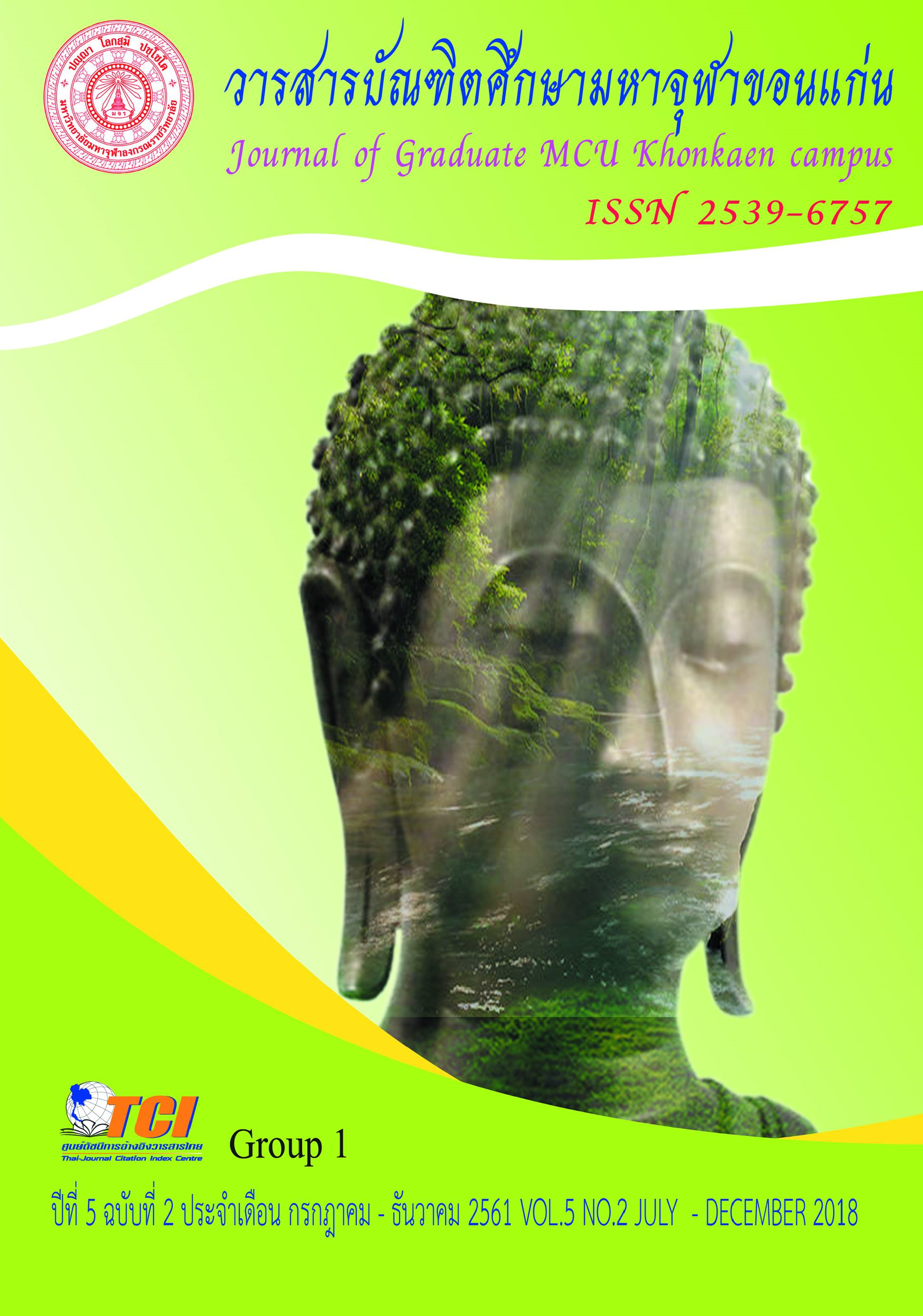การพัฒนาหลักสูตรฝึกอบรมการจัดการเรียนรู้ตามหลักปรัชญา ของเศรษฐกิจพอเพียงในสถานศึกษาขั้นพื้นฐาน
Main Article Content
Abstract
การวิจัยครั้งนี้มีวัตถุประสงค์เพื่อพัฒนาหลักสูตรฝึกอบรมการจัดการเรียนรู้ตามหลักปรัชญาของเศรษฐกิจพอเพียง ในสถานศึกษาขั้นพื้นฐาน โดยใช้วิธีการวิจัยแบบวิจัยและพัฒนา (Research and Development) แบ่งขั้นตอนการดำเนินการวิจัยออกเป็น 4 ระยะ ได้แก่ ระยะที่ 1 การศึกษาสภาพปัญหา และความต้องการพัฒนาหลักสูตรฝึกอบรมการจัดการเรียนรู้ตามหลักปรัชญาของเศรษฐกิจพอเพียง ระยะที่ 2 การพัฒนาหลักสูตรฝึกอบรมการจัดการเรียนรู้ตามหลักปรัชญาของเศรษฐกิจพอเพียง ระยะที่ 3 การทดลองและหาประสิทธิภาพของหลักสูตรฝึกอบรมการจัดการเรียนรู้ตามหลักปรัชญาของเศรษฐกิจพอเพียง และ ระยะที่ 4 การประเมินผลการใช้หลักสูตรฝึกอบรมการจัดการเรียนรู้ตามหลักปรัชญาของเศรษฐกิจพอเพียง ประชากรและกลุ่มตัวอย่างที่ใช้ในการวิจัยมี 4 กลุ่ม ตามลักษณะของรูปแบบการพัฒนาหลักสูตร กลุ่มตัวอย่างที่ใช้ในการเก็บรวบรวมข้อมูล ได้แก่ ครูผู้สอน ในโรงเรียนสังกัดสำนักงานเขตพื้นที่การศึกษาประถมศึกษาร้อยเอ็ด เขต 2 จำนวน 16 คน ได้มาโดยวิธีการคัดเลือกแบบเจาะจง เครื่องมือที่ใช้ในการวิจัย คือ หลักสูตรฝึกอบรมการจัดการเรียนรู้ตามหลักปรัชญาของเศรษฐกิจพอเพียง ในสถานศึกษาขั้นพื้นฐาน การฝึกอบรมด้วยวิธีผสมผสาน 2 วิธี จากการเรียนรู้ผ่านระบบออนไลน์ (Online) และการฝึกอบรมเชิงปฏิบัติการ (Off line) โดยนำผลการวิจัยที่ได้ไปประเมินหลักสูตรตามแบบจำลองซิป (CIPP Model) ของแดเนียล แอล สตัฟเฟิลบีม (Daniel L. Stufflebeam)
ผลการวิจัย พบว่า
1. การประเมินสภาวะแวดล้อม โดยการรวบข้อมูลสภาพปัญหาและความต้องการของครูผู้สอนในการจัดการเรียนรู้ตามหลักปรัชญาของเศรษฐกิจพอเพียง ซึ่งรวบรวมข้อมูลจากเอกสาร ตำรา งานวิจัย แบบสอบถาม แบบสัมภาษณ์ความคิดเห็นของผู้เชี่ยวชาญ นำมาวิเคราะห์ สรุปได้ว่า วัตถุประสงค์การฝึกอบรมคือ เพื่อพัฒนาความรู้ความเข้าใจ และความสามารถในการปฏิบัติการสอนให้มีประสิทธิภาพ ซึ่งหลักสูตรมีเนื้อหา 6 หน่วย โดยกำหนดหลักเกณฑ์ให้ผู้เข้ารับการอบรมเป็นครูผู้สอนที่มีความสนใจและสมัครเข้าร่วมการอบรม จำนวน 16 คน/รุ่น ใช้วิธีการฝึกอบรมด้วยวิธีผสมผสาน
2. การประเมินปัจจัยเบื้องต้น ผู้วิจัยได้สร้างเครื่องมือที่ใช้ในการประเมินความเหมาะสมและความสอดคล้องขององค์ประกอบหลักสูตรและเอกสารประกอบหลักสูตร ได้แก่ ความสอดคล้องของหัวข้อฝึกอบรมกับวัตถุประสงค์เชิงพฤติกรรม และความสอดคล้องระหว่างวัตถุประสงค์เชิงพฤติกรรมกับแบทดสอบ พบว่า มีดัชนีความสอดคล้องกันสูง ทำให้ร่างหลักสูตรฝึกอบรมมีความเป็นไปได้และมีความเหมาะสมสอดคล้องกับความต้องการของผู้เข้ารับการอบรม โดยนำหลักสูตรฝึกอบรมรวมทั้งเครื่องมือต่างๆ ที่ผู้เชี่ยวชาญประเมินแล้วไปศึกษาทดลองนำร่องใช้ได้หลักสูตรที่มีคุณภาพสามารถนำไปจัดฝึกอบรมได้
3. การประเมินกระบวนการ เมื่อนำหลักสูตรฝึกอบรมไปเก็บรวบรวมข้อมูลกับกลุ่มตัวอย่าง พบว่า หลักสูตรฝึกอบรมมีประสิทธิภาพ เท่ากับ 93.89/87.97 ซึ่งสูงกว่าเกณฑ์ร้อยละ 80/80 ที่ตั้งไว้ และค่าเฉลี่ยคะแนนความพึงพอใจของครูที่มีต่อหลักสูตรฝึกอบรมการจัดการเรียนรู้ตามหลักปรัชญาของเศรษฐกิจพอเพียงมีความพึงพอใจโดยรวมในระดับมากที่สุด
4. การประเมินผลผลิต โดยได้ติดตามผลการปฏิบัติการสอนตามหลักปรัชญาของเศรษฐกิจพอเพียงของครู พบว่า ครูมีคะแนนการปฏิบัติการสอนโดยรวมอยู่ในระดับมากที่สุด และผู้บริหารมีความพึงพอใจต่อการเข้ารับการอบรมของครู โดยรวมอยู่ในระดับมากที่สุด
The purpose of this research was to develop a training curriculum for learning management in the sufficiency economy philosophy in basic education institutions. The research use researching and development method and is divided into 4 stages. Stage 1: Studying of Problem Condition And requirement to develop a training course on learning management in according to the sufficiency economy philosophy. Stage 2: Development of training curriculum for learning management according to the sufficiency economy philosophy. Stage 3: Finding the effectiveness of the training course in learning management based on the sufficiency economy philosophy and stage 4 Evaluation of the Training Course for Learning Management in according to the sufficiency economy philosophy .
The population and sample groups of this study include four groups according to the characteristics of the curriculum development. The samples for collecting data consists of 16 teachers in the schools under the Office of Roi-Et Educational Service Area 2 derived from selecting approach. The research tool was a training course on learning management in the sufficiency economy philosophy in basic education. The learning course has Two-way integration of online learning and off line training and the results of the research were evaluated by Daniel L. Stufflebeam's CIPP Model.
The research found that
1. Environmental Assessment By collecting information on the problems and requirements of teachers in learning managing according to the sufficiency economy philosophy of. The data were collected from the research paper, the questionnaire, the expert interviews. To analyzed and concluded that The Training Objectives was developing knowledge and the ability to teaching according to the sufficiency economy philosophy efficiently. The course contains 6 learning units by setting the criteria for the trainees, 16 teachers in the generation who interested in the course and required to apply for the training using the combined method.
2. Basic Factor Assessment The researcher constructed a tool to evaluate the appropriateness and consistency of the curriculum components and curriculum materials including for Compliance of training topics with behavioral objectives and the consistency between the behavioral and the test objectives. The results showed a high consistency index that Make the training plan feasible and appropriate to the trainees requirements by the training courses and tools that the Experts have assessed the training program quality can be used to provide training.
3. Process evaluation. When the training curriculum was collected, the efficiency of the training program was 93.89 / 87.97, which is higher than the 80/80 set point and the mean score of the teachers' satisfaction on the training course according to the sufficiency economy philosophy was found to be the highest level of overall satisfaction.
4. Evaluation of productivity followed by the results of teachers ‘teaching practices according to the sufficiency economy philosophy, the results showed that the overall teaching performance was at the highest level and the results of the satisfaction evaluation of the administrators showed that they were overall satisfied with the teachers who received the training at the highest level.
Article Details
References
Silanoi, L. (2002). The development of instructional activities focused on learners is important in social studies for elementary school teachers. Graduated School : Khonkean University. Sintanakul, K. (2011). The development of training course for preparing computer teacher in integrated instruction. Graduated School : King Mongkut's University of Technology North Bangkok. Thongsoon, P. (2013). The teacher development of cultural tourism knowledge management program on local wisdom of lower Esan. Graduate School : Silpakorn University. Udomwong, J. (2013). Development of training curriculum for learning management in Sufficiency Economy according to philosophy of sufficiency economy. Karasin province: Joomjungplungrad school. Utranand, S. (2002). Curriculum theories. Bangkok : Mitsiam. Taba, Hilda. (1962). Curriculum Development : Theory and Practices. New York : Harcourt, Brace and World, Inc.

